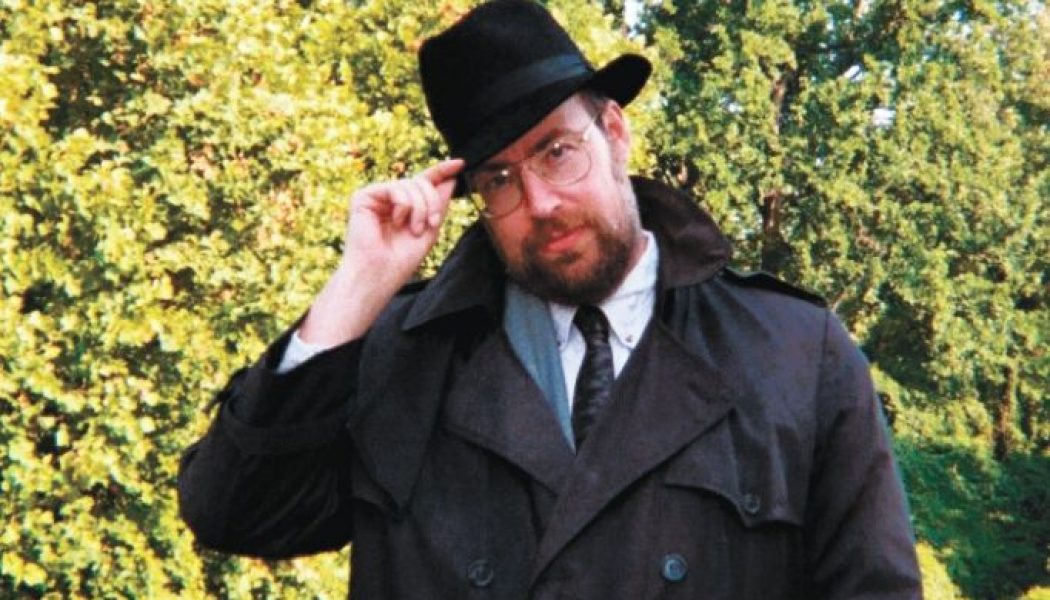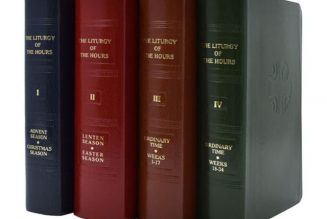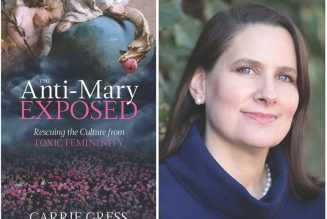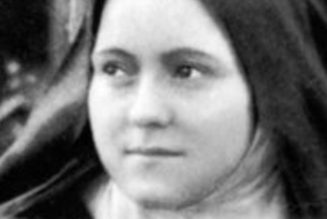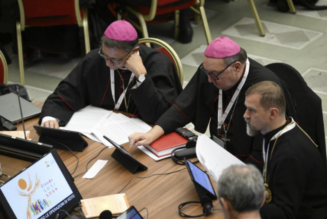
‘The Catholic writer is able to plunge more deeply into the enigma at the core of life,’ says sci-fi writer John C. Wright. (Courtesy of subject)
Fictions and Faith: Catholic Sci-Fi Writer John C. Wright Discusses His Craft
Convert-writer feels no need to hide his faith from his readers.
K.V. Turley
“No science fiction writer is imaginative enough to have pictured this combination of hysteria, incompetence, malice and affluence.” So says award-winning science fiction writer John C. Wright, down the line from his home in Virginia.
In this time of pandemic, Wright was speaking to the Register June 20, just as the lockdown began to ease across the Western world. The obvious question to ask a writer of speculative fiction is how recent events — which for many have been surreal and at times reminiscent of a premise for a sci-fi novel — compare to his own imaginings of future realities.
“I predicted a bioweapon release in one of my novels, and examined some of the social changes of communities treating all strangers as lepers,” Wright said, adding that “nothing I have invented comes near” to what the world is experiencing in the wake of the coronavirus pandemic.
He then added, “On the other hand, nothing I have invented comes near the absurdity of the outbreak of the Great War due to an incompetent anarchist shooting an archduke in Serbia. History is stranger than fiction, since we make fiction to suit ourselves.”
This leads to the obvious question: Why write fiction, and, in particular, sci-fi?
“Scope. I need elbow room,” Wright replied. “Tales in the science fiction and fantasy genre have, and must have, all the same elements of storytelling as crime novels or mainstream fiction: that is, plot, character, setting, prose and theme — but also it has one element more, which is world-building.”
Builder of Worlds
Undoubtedly Wright has been “world-building” in the 28 novels and dozens of short stories he has published since 2002. In that year he published his first novel, the acclaimed The Golden Age. The novel is set half a million years in the future in a voluntary anarchistic society spanning the solar system called the Golden Oecumene. Described by reviewers as “a rare and mind-blowing treat,” an “extraordinary feat of invention and plotting” and as “bursting with kaleidoscopic imagery, chronicling the quest of a far-future everyman in his journey of self-discovery,” Publishers Weekly saw in Wright’s debut, “this fledgling century’s most important new SF talent.”
Wright was on his way after that and has not looked back since, finding not just critical acclaim but a readership, too. He has also entered into the controversies currently raging around sci-fi, which are largely the same as those sociopolitical issues preoccupying wider society. To some extent, this reflection of contemporary life has always been part and parcel of a genre that is as popular as it is misunderstood. Wright and others may be writing about imaginary future worlds, but they write from this world, and of this world, if from a wholly unique perspective.
As Wright explained, “In order for prose to be science fiction or fantasy, at least one character, prop or setting element must be futuristic or fantastic, from outer space or Elf Land, future days or lost worlds. It must, in other words, be outside the everyday order we know. If it’s sci-fi, the element must follow, or seem to follow, the known principles of natural science; if fantasy, the element must follow the classical myths, legend and folktales in theme. This gives the sci-fi writer a much more abundant scope for the imagination to play in and to address issues and themes not open to the mainstream writer.”
Sci-Fi’s Catholic Basis
From its beginnings, sci-fi has attracted Catholic authors to the genre, Gene Wolfe being one of the most prominent.
Wright sees this as inevitable. “Catholicism is the cradle and summit of Western civilization, and it has preserved what of the ancient world is worth preserving. Catholics invented science. The scientific revolution was well underway before the ark of Christendom shipwrecked on the rock of the Reformation, and Western Christianity split in two.”
“Fiction, or, to call it by its older name, romance,” Wright maintained, “was invented in the Catholic Middle Ages, in poems and ballads, by poets from Dante to Shakespeare, who lived in the generation when Catholicism split into orthodox and heretic. The basic formula of the romance gave rise to the novel, starting with Cervantes, who came from a very Catholic Spain.”
For Wright, it is ideas counter to Catholicism that have relegated imaginative fiction to the literary fringes.
He pointed out that it was “a conspiracy of socialist literary critics and magazine owners in the late 19th and early 20th century” who decided that the supernatural “was to be relegated to children’s fiction and condemned as ‘lowbrow.’”
He observed, “Shakespeare could write about wizards like Prospero, and Dickens could write about time travel to a Christmas Yet to Come, but if Tolkien or Lewis, writing in the same vein, wrote of Middle Earth or Perelandra — heaven forbid! It was mocked as fit only for children and bumpkins, with many an elitist sneer.”
As a result, Wright contends that this fantastic element in storytelling “went underground” before springing to the surface “in the least likely place imaginable: American pulp magazines, specializing in adventure stories and weird tales.” As Wright recalled, “In my youth, no respectable elder could be seen reading science fiction, and the idea that it was a healthy artistic literature, while mainstream was fetid and moribund, was beyond contemplation.”
Letters Before the Law
Born in 1961, Wright grew up in a military family.
His childhood was largely “nomadic,” moving frequently within the United States.
Eventually, he enrolled in the Great Books program at St. John’s College in Annapolis, Maryland, graduating in 1984.
Thereafter, he received his juris doctor degree from the Marshall-Wythe School of Law of the College of William & Mary in 1987.
He did not practice law though, opting instead for a career in journalism, both as a reporter and an editor.
However, for as long as he can remember, he had wanted to be a novelist. By the start of the new century, he had achieved his goal.
Catholic in Imagination
In 2008, just as his sci-fi career was taking off, the real-life Wright converted to Catholicism.
When asked what drew him to the Church, his answer was short and direct: “I was visited by the Virgin Mary.”
And, further, when asked what keeps him in the Church, he is equally laconic: “Logic.”
When pressed, Wright added, “Of the two competing worldviews vying for the souls of modern man, one is the orthodox Catholic scheme, which proposes certain mysteries about the Trinity and the Incarnation nearly impossible to imagine or believe, but, in the light of those mysteries, explains man, the cosmos and his place in it — whence he comes and whither he goes. All art, science, learning, law and literature spring from these traditional roots.”
By contrast, Wright claims “the default worldview of the modern age is a degenerate form of Gnosticism, which takes some elements of the Christian worldview, such as compassion for the poor or the brotherhood of man, and then proceeds to cut and paste them awkwardly into a Darwinian or Hegelian background, before simmering the whole in Freud and Nietzsche until it is half-baked. The modern version goes by a variety of names subject to change every decade or so; names selected precisely because they mean the opposite of what they really mean.”
He summed this up as follows: “Neither ancient nor modern variations of this line of thought in Original Sin think that man’s evils spring from man, but instead from the world’s law and the world’s maker, so the world is false and must be destroyed.”
“So what keeps me in [the Church] is logic,” he concluded.
“Logic says the choice is binary: in or out. Outside is darkness, in which there is wailing and gnashing of teeth. Inside … allow me to quote: ‘Lord, to whom shall we go? Thou hast the words of eternal life.’”
Reflecting on his literary career since his conversion, Wright mused, “At first, I deemed it my duty as a writer to entertain my paying customers, keeping my personal opinions hidden. However, two events changed my mind. First, once it became known that I was Christian, the books I wrote when I was an atheist, which contained anti-Christian themes and scenes and sentiments not very well hidden, were savaged as apologetics and as propaganda by the sci-fi critics and gatekeepers. I was suddenly persona non grata, and my books were no longer reviewed in trade magazines; New York publishers stopped contacting me; editors stopped inquiring after my work.”
This experience prompted Wright to pen two openly Christian short stories — a ghost story and a Christmas story — published by a small press in Finland.
“These were not efforts at preaching, or allegory, both of which I congenitally detest,” he said, “but merely tales whose background assumptions about life, the afterlife, morality and magic are seen through a Christian lens.”
Wright then went on to tell of the “second event”: the moment when he received a tear-stained letter written in response to one of these openly Christian stories.
“The reader had suffered the death of a child, as had the character in my tale, and was profoundly moved by the story and found hope when hope was lost.”
For Wright that “good opinion of that one reader whom heaven arranged to read my tale meant, and means, more to me than all the false clamor and pomp of the empty husk of the sci-fi community.”
Today, Wright feels no need to hide his faith from his readers: “I am wary of having my opinions ‘talk over’ my muse. I wish dearly to avoid the temptation to preach, but an author writes from the heart, and if Christ is in my heart, something of light may, like it or not, spill onto the page.”
Going further, Wright sees now a positive link between his faith and fiction: “Catholicism equips the imagination with a knowledge of man and man’s role in the universe. The Catholic writer, if he heeds his muse, is able to plunge more deeply into the enigma at the core of life and speak more poignantly to the human heart.”
K.V. Turley is the Register’s
This story was updated after posting.
